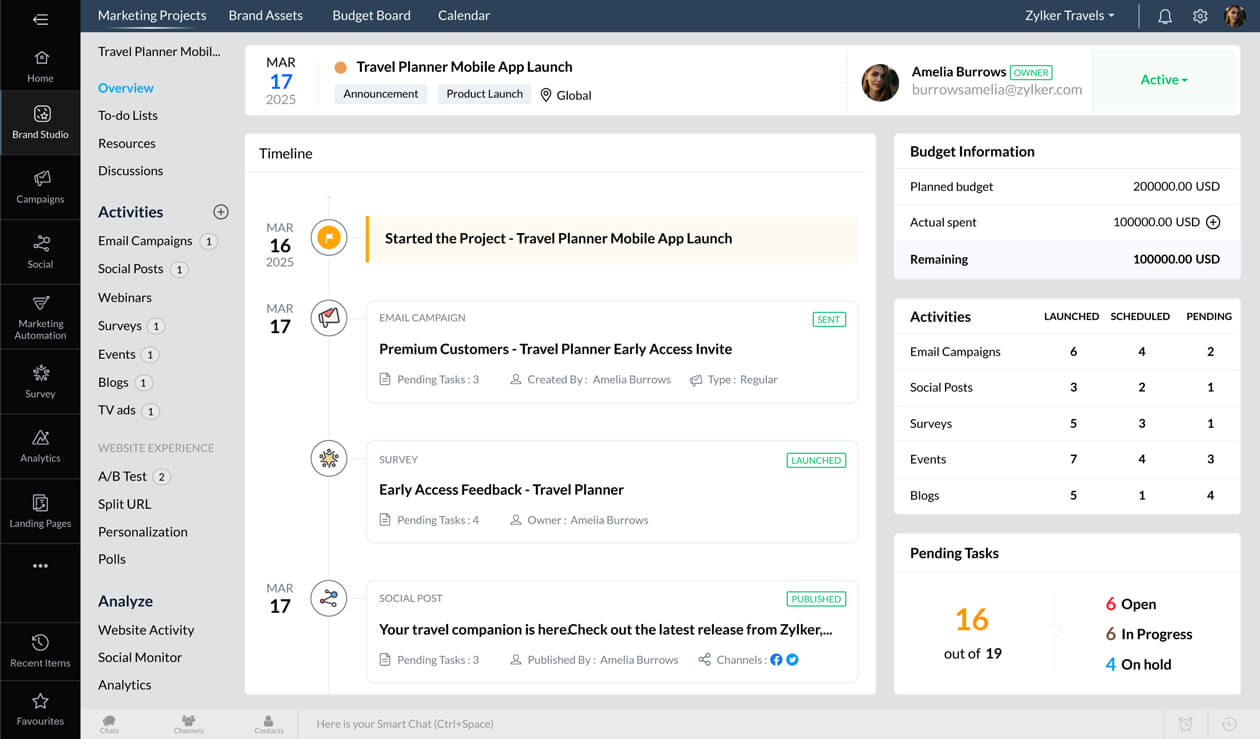What is digital marketing?
Digital marketing is the act of promoting your brand or business through various digital channels to generate leads and engage with prospective customers across multiple touchpoints. What makes digital marketing truly powerful is its measurability and adaptability. Every campaign can be tracked, analyzed, and optimized in real time. You can understand what's working and what's not, and continuously refine your strategy to get better results.
Get StartedWhat are the types of digital marketing platforms?
While "digital marketing" is a commonly used term, many businesses and marketers get confused about the types of digital marketing platforms available and what exactly falls under that umbrella. Digital marketing consists of a wide range of channels and activities. Below are a few major ones you should consider:
Content marketing
This is one of the most preferred—and unavoidable—pillars of today's marketing world. Content marketing uses storytelling and content to convey your brand's value to your target audience. Good, engaging content is key to getting your audience's attention, and there's no certain way to succeed in content marketing. It's essential to find what your audience loves and what resonates with your brand story before getting started. As people often say, content is king—and being consistent with it is key!
Search engine optimization (SEO)
A common question from brands and marketers who are just getting started is, "What is digital marketing and SEO?" As you create content, you also need to find ways to reach audiences who are actively searching for the same product or service—and that's exactly what SEO helps you achieve. It involves optimizing your website content to rank higher on search engine result pages through organic and paid methods. Blending content with SEO insights effectively can help you attract the right audience and drive meaningful traffic to your site.
Social media marketing
In today's digital world, everyone recognizes the impact of social media. For many brands, social media platforms have become the best medium through which to build communities and establish credibility. When you strategize effectively, align it with your brand's tone, and avoid sounding too pushy, social media marketing can work wonders. Additionally, paid activities such as ads can help generate leads and increase brand awareness when your targets are set correctly.
Email marketing
Email marketing gives you the space to make your messaging more personal and engaging, as it involves directly reaching out to your audience through email. When done right—with concise messaging, a well-segmented mailing list, and the right frequency—it can be highly effective. You can also use email marketing to drive traffic to your blogs, newsletters, and other key pages.
SMS marketing
SMS marketing can fetch even higher engagement rates, as text messages land directly in your target audience's mobile phones. It's important to ensure your sender information is verified and doesn't look like spam, and it's essential to keep your content relevant and concise. Using SMS marketing during sales or discount programs can increase visibility.
How do I get started with digital marketing?
- Map out the goals and metrics you want to achieve through digital marketing. For example, if you're just starting out and want to increase brand awareness, pick a tool that supports that.
- Use a mix of digital marketing platforms to achieve your goals. For example, link newsletters in the emails you send out to customers and promote your blogs on social media.
- Allocate a budget and gradually start testing out paid methods. Make sure to experiment before investing heavily.
- Invest in good digital marketing analytics tools and measure what has worked for you to refine your digital marketing strategies.
Zoho Marketing Plus: The unified digital marketing tool for your business
Choosing the right tool for your digital marketing activities can be difficult with so many options available—and having separate tools for each of these activities can over-complicate your efforts. With Zoho Marketing Plus, you can manage all of these activities under one dashboard. You can plan, execute, collaborate, and analyze using the same tool—which makes your marketing journey easier.
